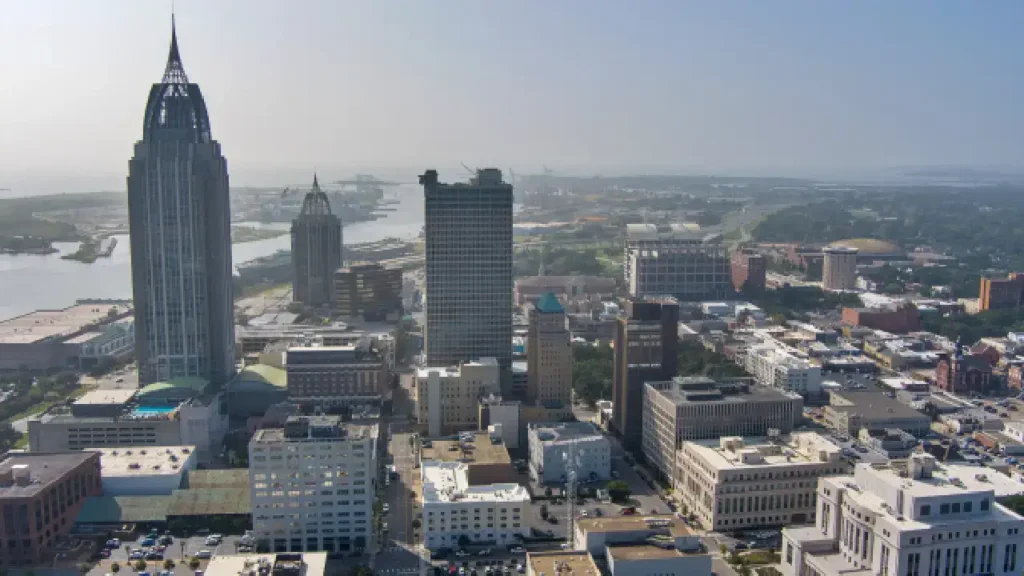Alabama businesses once relied on asbestos in many products, spanning many industries. The devastating impact of asbestos exposure left people with deadly diseases. Many are now fighting back with the help of an experienced Alabama mesothelioma lawyer.
If you’ve been diagnosed with mesothelioma, asbestos-related lung cancer, or asbestosis, keep in mind that you may be eligible for a considerable amount of compensation. We invite you to fill out our form today for a free Financial Compensation Packet, filled with information about top Alabama mesothelioma lawyers, how to get paid in 90 days, how to file an asbestos trust fund claim, and much more.
Understanding the process and timeline for receiving compensation is crucial. Many clients can expect to start receiving their compensation in as few as 90 days. This initial payment is just the beginning, with additional checks arriving over the next year or so until the case reaches full resolution.
By utilizing our resources and expert guidance, you can navigate the complexities of filing claims and ensure a steady flow of compensation while your case progresses.
- Comprehensive Guidance: Get detailed instructions on filing claims.
- Expert Connections: Access a network of top Alabama mesothelioma lawyers.
- Timely Compensation: Learn how to expedite your payments to start in 90 days.
This approach ensures you are not only informed but also equipped to take action swiftly and effectively. Get started today and secure the financial support you need.


FREE Financial Compensation Packet
- Info on law firms that will recover your HIGHEST COMPENSATION
- Learn how to get paid in 90 days
- File for your share of $30 billion in trust funds
We offer assistance in all cities and towns in Alabama, including:
Birmingham, Huntsville, Montgomery, Mobile, Huntsville, Tuscaloosa, Hoover, Dothan, Auburn, Decatur, Madison, Florence, Phenix City, Gadsden, Prattville, Vestavia Hills, Alabaster, Opelika, Enterprise, Bessemer, Homewood, Northport, Athens, Daphne, Anniston, Prichard, Pelham, Albertville, Oxford, Trussville, Tillmans Corner, Mountain Brook, Selma, Troy, Helena, Fairhope, Center Point, Hueytown, Talladega, Foley, Millbrook, Cullman, Alexander City, Ozark, Scottsboro, Hartselle, Jasper, Fort Payne, Gardendale, Saraland, Muscle Shoals, Pell City, Eufaula, Calera, Sylacauga, Jacksonville, Moody, Irondale, Leeds, Chelsea, Fairfield, Gulf Shores, Forestdale, Saks, Pleasant Grove, Atmore, Russellville, Clay, Boaz, Rainbow City, Valley, Sheffield, Andalusia, Tuskegee Bay, Minette, Meadowbrook, Fultondale, Clanton, Tuscumbia, Southside, Guntersville, Arab, Greenville, Spanish Fort, Pike Road, Wetumpka, Demopolis, Pinson, Brook Highland ,Hamilton, Opp, Oneonta, Montevallo, Lanett, Lincoln, Monroeville, Tarrant, Meridianville, Satsuma, Roanoke, Chickasaw, and more.
Alabama Asbestos Statistics

- Alabama ranks in the middle of states for deaths related to asbestos.
- There were 3,845 asbestos-related deaths in the state from 1999 to 2017.
- Most of those deaths were from lung cancer, followed by asbestosis, and 616 deaths from mesothelioma.
- Jefferson County has the highest number of asbestos-related deaths in the state.
A History of Asbestos Use in Alabama
The current upsurge of malignant mesothelioma diagnoses and mesothelioma lawsuits in the state is a result of the heavy industrial use of asbestos in Alabama during the 20th Century:

- The demand for heavy-duty insulation and fire-resistant materials grew during this period, and asbestos became the choice for factories, steel mills, oil refineries, shipyards, and power plants from fire and explosion.
- The peak use of asbestos coincided with Alabama’s shift from an agricultural economy to an industrial one. World War II created war jobs in shipyards and other defense production facilities.
- These job sites used asbestos and asbestos-containing materials (ACMs) within the facilities and in the ships, planes, and land vehicles manufactured there.
- Shipfitters, pipelayers, electricians, steampipe builders, and dockyard workers in Alabama’s biggest shipbuilding city, Mobile, absorbed dangerous levels of asbestos fibers while at work.
Understanding Mesothelioma: Symptoms and Diagnostic Challenges
Mesothelioma, a rare but aggressive cancer, can be notoriously elusive when it comes to diagnosis. One major obstacle is that its symptoms often mimic those of more common ailments, making early detection difficult. Here’s a closer look:
Common Symptoms
- Persistent Cough: Often confused with chronic bronchitis or allergies.
- Chest Pain: Can resemble symptoms of other respiratory conditions.
- Shortness of Breath: Frequently mistaken for asthma or lung infections.
- Fatigue: A general sense of tiredness not uncommon in various illnesses.
Diagnosis Challenges
- Delayed Onset: The latency period is particularly prolonged, with symptoms potentially emerging decades—anywhere from 20 to 50 years—post-exposure to asbestos, the primary risk factor.
- Symptom Overlap: Symptoms overlap with those of less serious diseases. This overlap complicates the clear identification and often delays targeted investigations.
- Specialized Testing Requirements: Diagnostic procedures for mesothelioma can involve complex tests. Imaging scans, biopsies, and blood tests may be necessary to pinpoint the disease, requiring a multidisciplinary approach.
Understanding the symptoms and the hurdles in diagnosing mesothelioma underscores the need for thorough medical evaluations, especially for individuals with past asbestos exposure. Early and accurate detection is vital for effective management.
How To Seek Compensation for Mesothelioma in Alabama
Mesothelioma is caused by negligent asbestos exposure, most often in the workplace. Alabama residents with mesothelioma and other asbestos illnesses can seek compensation through one or more legal actions:
- Personal Injury Lawsuit. Mesothelioma is considered a personal injury when caused by negligent asbestos exposure. You can file a lawsuit to sue companies for damages. These lawsuits usually end in settlements, but some go to trial, where you might get a jury award. On average, mesothelioma lawsuits award between $1 million and $11.4 million, depending on whether the case settles or proceeds to court.
- Wrongful Death Lawsuit. If your loved one dies from mesothelioma, you can file a wrongful death lawsuit to recover damages. These cases can similarly result in settlements or courtroom awards and aim to provide financial relief for your family’s loss.
- Asbestos Trust Fund Claim. Many asbestos companies went bankrupt and can no longer be sued. If this is the case in your situation, you can make a claim with asbestos trusts set up by the companies to compensate victims. These funds are designed to ensure that those affected still receive necessary compensation.
Additionally, over 99% of mesothelioma lawsuits result in settlements, meaning that many claimants receive compensation without having to endure a court trial. This process can be further facilitated by legal professionals who help in identifying the asbestos-containing products responsible for exposure and holding accountable those companies involved.
Another way to be compensated for your illness is to apply for appropriate benefits, which can further aid in covering treatment costs and securing your family’s financial future. Engaging with experienced attorneys can be crucial in navigating these options and maximizing your potential compensation.
Veterans’ Benefits for Mesothelioma through the VA
If a veteran or their family member is dealing with mesothelioma due to asbestos exposure during military service, there are several benefits available through the Department of Veterans Affairs (VA). Here’s a detailed look at what veterans can claim:
Monthly Compensation
- Disability Compensation: Mesothelioma is assigned a 100% disability rating. This qualifies veterans for substantial financial compensation, possibly exceeding $3,800 per month.
- Additional Support: Depending on the veteran’s circumstances, including the need for special aid or having dependents, additional financial assistance may be available.
Healthcare Benefits
- Comprehensive Medical Care: Veterans diagnosed with mesothelioma have access to extensive medical support, including specialized treatment and healthcare services, free of charge.
Legal Assistance
- Claim Support: Even if a veteran’s claim has been denied previously, VA-accredited lawyers can provide guidance to ensure a strong case is presented when applying for these benefits.
This comprehensive package of benefits is designed to provide both financial support and healthcare resources, ensuring veterans receive the care and assistance they deserve. Filing a separate lawsuit for mesothelioma will not interfere with their VA claim, allowing veterans to explore all possible avenues for securing the support they need.
Which Job Sites in Alabama Used Asbestos?
These are just a few of the many workplaces in Alabama known to have contained asbestos:
- Hunt Refining Company refinery in Tuscaloosa
- Anniston U.S. Army Depot in Anniston
- Steiner Shipyard in Bayou La Batre
- Alabama Drydock & Shipbuilding in Mobile
- Austal USA shipyard in Mobile
- Gulf Shipbuilding in Chickasaw
- James M. Barry Electric Generating Plant in Bucks
- Gulf States Steel Mill in Gadsden
- Redstone Army Arsenal in Huntsville
- U.S. Army base in Ft. McClellan
- Maxwell Air Force Base in Montgomery
- U.S. Army Aviation Base at Ft. Rucker
- Columbia General Hospital
- Alabama Power Company
- Stevens Manufacturing
- Southern Natural Gas
- Hercules
- Alabama Oxygen
Occupations at Risk for Asbestos Exposure in Alabama:
The risk of asbestos exposure isn’t confined only to specific locations; it also extends to various occupations. Individuals in the following fields are particularly vulnerable:
- Auto or aircraft mechanics
- Boilermakers
- Cabinet makers
- Carpenters
- Construction workers
- Custodial and maintenance workers
- Drywall installers
- Electricians
- Factory workers
- Firefighters
- Insulators
- Miners
- Painters
- Plumbers
- Shipyard workers
- U.S. Military service members
Even those who haven’t worked directly with asbestos can be at risk due to secondhand exposure, underscoring the importance of awareness and prevention across industries.
Alabama Shipyards and Asbestos
Shipbuilding and shipping are big industries in Alabama, both military and civilian. The military was a significant buyer of asbestos, especially for use in Navy warships, oil tankers, and other support vessels.
Asbestos was heavily used in all kinds of ships and may still be in:
- Insulation
- Steam pipes
- Turbines
- Boilers
- Pumps
- Valves
- Fireproofing
- Paneling
- Firefighting gear
- Adhesives
The personnel most often exposed to asbestos usually were shipyard workers who worked in maintenance details aboard ships. Soldiers, Marines, and sailors were exposed when fibers kicked up during battles or at-sea repair jobs.
When Navy and civilian vessels built in Alabama shipyards returned for refits or repairs, the workers risked exposure.
Repair work is one reason why males of working age in the 1930s, 1940s, and 1950s tend to be diagnosed with malignant mesothelioma more than women of the same age.
Where Else Was Asbestos Used in Alabama?
Older buildings in the state often still contain asbestos. The construction industry used it almost as ubiquitously for decades as in ships.

Asbestos can be found in buildings predating the 1970s, especially in schools, auto repair shops, public buildings such as courthouses and town halls, and private residences and apartment buildings.
Normally, asbestos in older buildings is not dangerous unless the fibers are stirred up.
In most cases, this occurs only when maintenance workers or renovators carry out routine repair work or upgrade the buildings.
Working with an Asbestos or Mesothelioma Lawyer in Alabama
Pursuing asbestos litigation in Alabama is notoriously tricky. The state has a one-year statute of limitations on asbestos lawsuits.
The statute makes suing companies where asbestos exposure took place challenging. It typically takes decades for the symptoms of asbestos illnesses to manifest.
But victims do have options. An asbestos lawyer or law firm can make a claim from an Alabama plaintiff and have the case tried out of state.
If you or someone you care about is now sick after past asbestos exposure, contact an Alabama mesothelioma lawyer to find out your options for suing and getting compensation.
What is the Cost of Hiring an Asbestos Attorney in Alabama?
When considering legal action for asbestos exposure in Alabama, you might be concerned about the costs involved. However, hiring an asbestos attorney doesn’t need to strain your finances.
Most asbestos attorneys operate on a contingency-fee basis. Here’s what this means for you:
- No Upfront Fees: You are not required to pay any legal fees when starting your case.
- Pay Only Upon Success: The attorney’s fees are contingent upon winning your case. If you don’t receive compensation, you don’t pay attorney fees.
- Out-of-Pocket Costs: Any additional costs during the process typically don’t fall on you, as they are usually covered by the law firm or deducted from your final settlement.
This fee structure alleviates financial stress, allowing you to focus on your health and recovery.
Alabama Laws Regulating Mesothelioma Lawsuits
State governments regulate mesothelioma and asbestos lawsuits. How to proceed and any limitations vary depending on where you file.
When You Can File – The Statute of Limitations

The statute of limitations for filing an asbestos-related lawsuit is strict in Alabama.
Plaintiffs have a year from the time of diagnosis or one year within the time the asbestos-related disease should have been reasonably diagnosed.
Wrongful death lawsuits must also be filed within one year of the victim’s date of death.
Contributory Negligence in Alabama
Contributory negligence is a legal term that describes how much a plaintiff can recover in damages when they share some blame for the asbestos exposure.
This law in Alabama does not favor victims. If you can be shown to be at all negligent in your exposure to asbestos, you might not be able to recover any compensation in a lawsuit. This is unlikely to be an issue in a mesothelioma case.
Take-Home Duty for Secondhand Asbestos Exposure
Secondhand exposure occurs when a worker unknowingly brings asbestos out of the workplace, often on their clothing or hair. Someone in the home is then exposed to that asbestos. Many people have developed mesothelioma after this type of exposure.
Alabama recognizes that companies have a take-home duty for asbestos exposure. This means they can be held liable for secondhand exposure. They had a duty to warn workers of the risks of exposing other members of their households.
Examples of Asbestos Verdicts and Settlements in Alabama
Expert asbestos lawyers who understand Alabama state laws have been able to win compensation for their clients:
- In 1998, a jury in Texas awarded $115 million to 21 steel workers exposed to asbestos at an Alabama steel mill.
- An Alabama woman sued her husband’s workplace, the Tennessee Valley Authority, after she developed mesothelioma through secondhand exposure. A jury awarded her $3.5 million. The court’s decision on this case in 2017 helped ensure companies have take-home duty in Alabama.
- In 1995, four people exposed to asbestos through Owens-Corning insulation received $450,000 in their lawsuit against the company.
These figures, while significant, illustrate that mesothelioma settlements and verdicts can vary widely. On average, a mesothelioma settlement ranges from $1 million to $1.4 million, providing a substantial financial cushion for those affected. For verdicts, the stakes can be even higher, with typical amounts ranging between $5 million and $11.4 million.
It’s crucial to understand that the value of a mesothelioma case depends on numerous factors. The severity of the illness, the duration of asbestos exposure, and specific state laws all play pivotal roles in determining the outcome. As such, having experienced legal counsel can significantly influence the compensation received, ensuring that victims and their families are adequately supported.
What Are Alabama’s Asbestos Safety Laws?
According to the Alabama Department of Environmental Management, there are several laws in place to protect the public and workers:
- Before any asbestos removal, whether from homes, buildings, or facilities, you must first inform the state in writing of what kind of asbestos will be disturbed (friable or not), as well as what method will be used to remove and dispose of the asbestos.
- Anyone who plans to remove asbestos must be certified as an asbestos removal professional through the state of Alabama.
- All asbestos removal technicians in Alabama must follow the Occupational Health and Safety Administration’s (OSHA) guidelines.
- Before beginning any project that will disrupt asbestos, requests must be written to the state within ten days before starting the activities.
- Smaller asbestos abatement projects do not require prior authorization from the state. Smaller projects include less than 35 cubic feet, 260 linear feet, and/or 160 square feet.
- Public school buildings built with asbestos must be inspected and maintained regularly. The school districts must send written reports of all maintenance and inspections to the state and keep an emergency plan on file if asbestos is disrupted.
For more detailed information or if you have any questions or concerns before starting a project that includes removing or disturbing asbestos, contact the DEM at 334-271-7700.
Mesothelioma Treatment in Alabama
Living with an asbestos-related disease and finding the best mesothelioma treatment is never easy for victims.
It’s important to find a physician that specializes in asbestos-related diseases. This is a rare disease that requires the expertise of specialists for the best outcomes.
The University of Alabama Comprehensive Care Center in Birmingham is an NCI-designated care center with researchers, physicians, cancer experts, and healthcare specialists focusing on mesothelioma and other asbestos-related diseases.
These lawyers made us feel so much better about going through this terrible process. We had no idea where to begin and they helped get us all the compensation we possibly could. They were friendly understanding and very hard-working
-Natalie F.
Legal Help in Alabama
Remember, if you’ve been diagnosed with mesothelioma, asbestos-related lung cancer, or asbestosis, you may qualify for significant compensation. Don’t forget to fill out our form to get our free Financial Compensation Packet, filled with information on the leading Alabama asbestos and mesothelioma attorneys in your area. If you need additional assistance, contact us toll-free at 800-793-4540.

Lawrence Holcomb
Reviewer and EditorAfter a career in asbestos abatement and remediation, Lawrence Holcomb earned a law degree to put his expertise to use in the service of mesothelioma and asbestosis victims. As a lawyer with mesothelioma focused Flint Law Firm, LLC in Birmingham, Alabama, he has litigated many asbestos cases and has helped win more than $50 million in settlements.
References
- Environmental Working Group. (n.d.). Asbestos-Related Deaths in Alabama.
Retrieved from: http://www.asbestosnation.org/facts/asbestos-deaths/al/ - Environmental Working Group. (n.d.). Asbestos: Think Again.
Retrieved from: http://www.ewg.org/research/maps/deaths-due-asbestos-related-diseases - Maxwell Air Force Base. (n.d.). Maxwell Air Force Base.
Retrieved from: http://www.maxwell.af.mil/ - Supreme Court of Alabama. (1995, May 19). Owens-Corning Fiberglass Corp. v. Gant.
Retrieved from: https://casetext.com/case/owens-corning-fiberglass-corp-v-gant - Allen, S. (2015, October 6). $3.5M Judgment Issued Against TVA.
Retrieved from: https://www.decaturdaily.com/m-judgment-issued-against-tva/article_e35dc1ad-8ef3-520b-b6df-933ea31396e2.html
